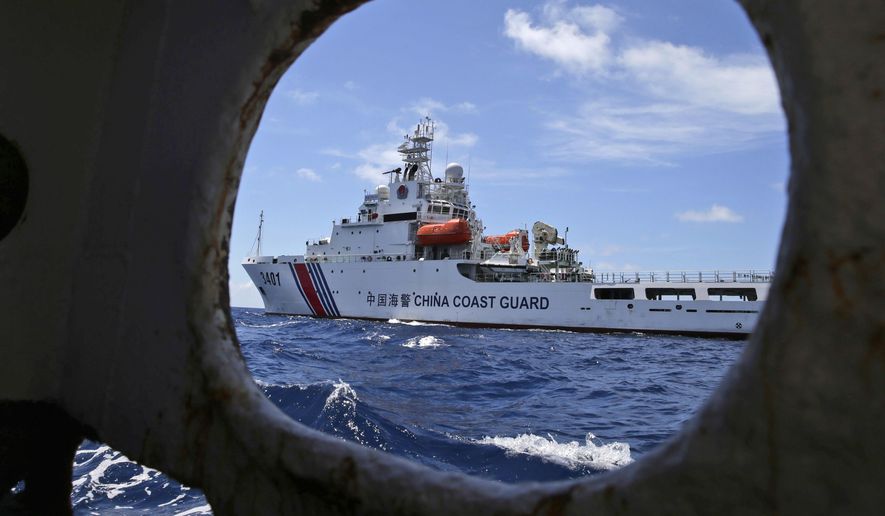The United States is raising concerns that a new Chinese maritime law authorizing coast guard vessels to fire on ships in the South China Sea may escalate disputes in the region.
The complaints echo critical comments in recent weeks by the Philippines, Vietnam, Indonesia, Japan that the explicit militarization of China’s coastal forces.
Japanese officials say the law could exacerbate tensions with Beijing over regular challenges between the two powers for control of disputed islands, a point also underscored by State Department spokesman Ned Price on Friday.
“We are specifically concerned by language in the law that expressly ties the potential use of force, including armed force by the China coast guard, to the enforcement of China’s claims in ongoing territorial and maritime disputes in the East and South China Seas,” Mr. Price said.
Mr. Price also reaffirmed the Trump administration’s legal declaration made in July rejecting Chinese maritime claims over the South China Sea.
The declaration said Chinese assertions on the sea are “completely unlawful.” The declaration marked a major shift in U.S. policy. Past administrations had said the U.S. government was neutral in the territorial disputes.
China in 2013 began a major campaign of island-building on disputed South China Sea islands and in 2018 began deploying anti-aircraft and anti-ship missiles on some of the islands.
U.S. officials say the militarization of the islands violated a 2015 pledge given by Chinese President Xi Jinping.
The missiles are now capable of threatening transiting ships and aircraft in a waterway used by shipping to move an estimated $3.5 trillion in goods.
“China’s harassment in these areas of other claimants, state hydrocarbon exploration or fishing activity, or unilateral exploitation of those maritime resources is unlawful,” Mr. Price said.
Mr. Price told reporters China’s authorization for coast guard vessels to use force “may escalate ongoing territorial and maritime disputes.”
“Language in that law, including text allowing the coast guard to destroy other countries’ economic structures and to use force in defending China’s maritime claims in disputed areas, strongly implies this law could be used to intimidate the PRC’s maritime neighbors,” Mr. Price said, using the acronym for People’s Republic of China.
The use-of-force provisions of the law could be used by China to press its claims in the South China Sea.
Japan’s Kyodo news service reported Sunday that two Chinese coast guard vessels had sailed in waters near the disputed Senkaku Islands on Sunday for the second day in a row. It was the ninth intrusion by Chinese coast guard vessels this year, Kyodo said, and sparked an official protest from the government in Tokyo.
China announced the new law in January and it took effect earlier this month. It authorizes the coast guard to use force against foreign actors and to dismantle foreign structures in disputed areas. The Chinese coast guard is the largest maritime law enforcement fleet in the region.
China has declared an estimated 90% of the South China Sea as its maritime territory.
That claim was ruled unlawful in 2016 by the Netherlands-based Permanent Court of Arbitration, a judicial body set up under the United Nations Convention on the Law of the Sea.
The court ruled in favor of the Philippines which brought the suit against China.
China, however, rejected the ruling and continues to claim it owns the South China Sea.
U.S. warships have been conducting stepped up “freedom of navigation” operations in the South China Sea in recent months. Earlier this month, two U.S. aircraft carriers conducted operations in the sea in a major show of force.
“The United States reminds China of its obligations under the United Nations Charter to refrain from the threat or use of force, and to conform its maritime claims to the International Law of the Sea, as reflected in the 1982 Law of the Sea Convention,” Mr. Price said. “We stand firm in our respective alliance commitments to Japan and the Philippines.”
Chinese officials have argued the new law can improve stability by clarifying the rules of engagement in areas where the Chinese coast guard operates. They also say other countries, including the U.S. and South Korea, have long authorized a military role for their coast guard units.
• Bill Gertz can be reached at bgertz@washingtontimes.com.




Please read our comment policy before commenting.